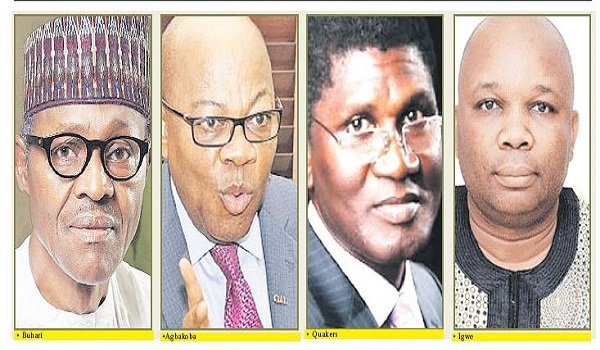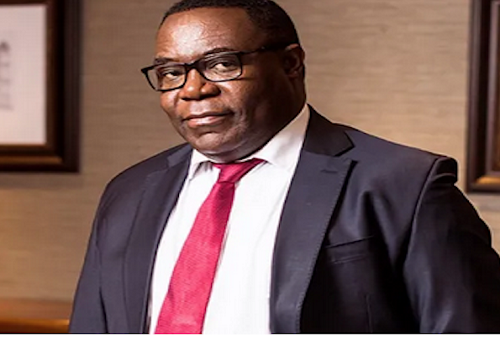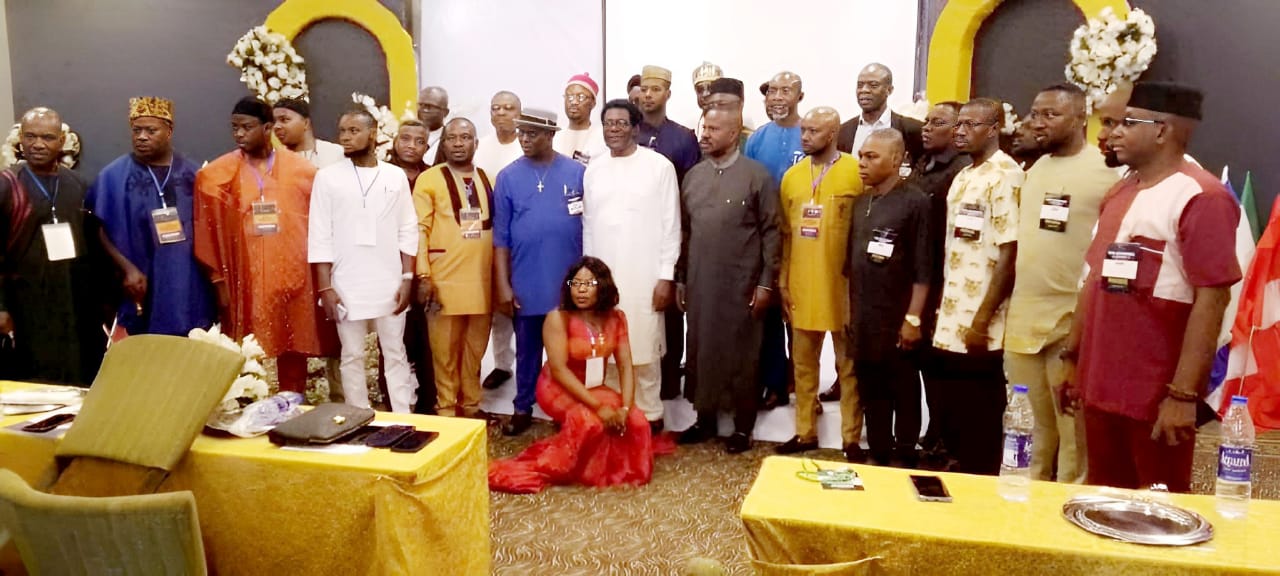Chinese Loans And Nigeria’s Sovereign Immunity

Many Nigerians are worried that the country is drowning in debt. There is hardly a month the Federal Government does not talk about borrowing either commercial loans or the concessionary type. However, what is giving Nigerians serious cause for concern is the possibility that China, one Nigeria’s creditors, may have planted a clause in the agreement that will force Nigeria to give up its critical national assets if it fails to repay the loans. ASSISTANT EDITOR NDUKA CHIEJINA of The Nation reports on the status of the sovereign immunity clause.
Nigerians once again suffered a panic attack when it was rumoured that the Chinese government was taking over the Ugandan International airport in Entebe.
The basis for the alleged Chinese takeover of Entebe International Airport was the inability of the Ugandan government to meet its obligation to pay back the loan it collected from the Chinese government.
In August 2020, there was a raging debate that the federal government has signed away the country’s sovereignty to China by endorsing a clause which suggested that Nigeria will waive its sovereignty and allow China to take over national assets it deems fit in place of the unserviced loan.
One year after, the ‘Ugandan rumour’ has thrown up questions again about what Nigeria has pledged to China as collateral for the loans collected.
The Director General of the Debt Management Office (DMO) Ms. Patience Oniha has assured Nigerians that there is no threat to the nation’s assets. To ensure the safety of these assets, Oniha said: “Nigeria prioritises debt service. Several measures which operate seamlessly have been put in place to ensure that data on debt are available and that debt is serviced as at when due.”
She went on: “Provisions are made explicitly for Debt Service on External Debt and Domestic Debt in the annual budgets. The DMO maintains proper records of debts (Domestic and External), provides projections for Debt Service which are captured explicitly as Debt Service in the annual budgets, and processes the actual payments for the debt service in conjunction with the Office of the Accountant General of the Federation and Central Bank of Nigeria.”
Government is so serious about servicing its debts so much so that proving funds for debt servicing takes utmost precedence when preparing the nation’s annual budget, while other segments of national life have to settle for debt service left over.
Oniha stated that “before any foreign loan is contracted (including through the issuance of Eurobonds), they are approved by the Federal Executive Council and thereafter, National Assembly”.
The terms and conditions of the Chinese and other loans she said are meticulously read through by officials of the federal ministry of justice before the federal ministry of finance signs off on the documents. According to her, “an important and extremely critical step is that the Loan Agreements are cleared and approved by the Federal Ministry of Justice and an Opinion is issued by the Honourable Attorney General of the Federation and Minister of Justice before the Agreements are signed”.
With regards to a party not meeting its end of the agreement, Oniha stated that “the Loan Agreements provide that where there is a dispute between the Parties, the first action is that the Parties should resolve it within themselves and if that fails, they go to arbitration. In other words, a lender, in this case, China would not just possess an asset at the first sign of a dispute including defaults”.
Since June 2020, the DMO has been sensitizing Nigerians on the issue of China Loans through a publication on the DMO’s website and has since then published information (projects, loan amount, Interest Rate, etc.) on all China Loans to Nigeria on its website.
How much loan has Nigeria taken from China?
As of March 31, 2020, the total borrowing by Nigeria from China was USD3.121 billion (N1,126.68 billion at USD/N361). This amount represents only 3.94 per cent of Nigeria’s Total Public Debt of USD79.303 billion (N28,628.49 billion at USD/N361) as of March 31, 2020. Similarly, in terms of external sources of funds, loans from China accounted for 11.28 per cent of the External Debt Stock of USD27.67 billion on the same date. This data, the DMO said, “shows that China is not a major source of funding for the Nigerian Government”.
What are the terms of the loans from China and what were they used for?
The total borrowing from China of USD3.121 billion as of March 31, 2020, are concessional loans with interest rates of 2.50 per cent per annum, the tenor of twenty years (that is 20 years to repay the loan) and grace period (Moratorium) of seven years.
These terms the DMO said are in accordance with “the provisions of Section 41 (1a) of the Fiscal Responsibility Act, 2007. In addition, the low-interest rate reduces the Interest Cost to Government while the long tenor enables the repayment of the principal sum of the loans over many years. These two benefits, make the provisions for Debt Service in the annual budget lower than they would otherwise have been if the Loans were on commercial terms”.
The USD3.121 billion Chinese loans are project-tied. The projects, 11 in number as at March 31, 2020), include the Nigerian Railway Modernization Project (Idu-Kaduna section); Abuja Light Rail Project; Four Airport Terminals Expansion Project (Abuja, Kano, Lagos and Port Harcourt); Nigerian Railway Modernization Project (Lagos-Ibadan section) and Rehabilitation and Upgrading of Abuja – Keffi- Makurdi Road Project.
The impact of these loans Oniha said “is not only evident but visible. For instance, the Idu – Kaduna Rail Line has become a major source of transportation between Abuja and Kaduna. Also, the new International Airport in Abuja, has improved air transportation for the populace, while the Lagos – Ibadan rail line, when completed, will ease traffic on the busy Lagos -Ibadan Expressway”.
The projects also have the added benefits of job creation, not only by themselves but through direct and indirect service providers, a number of which are Small and Medium Enterprises. “It is widely accepted that investment in infrastructure is one of the most effective tools for countries to achieve economic growth and development. Using loans from China to finance infrastructure is thus in alignment with this position, the DMO boss said.
What the lawyers say
A former President of the Nigerian Bar Association (NBA), Dr. Olisa Agbakoba (SAN), told The Nation last year that he believes there is nothing to worry about. He dismissed the claim that the sovereign immunity clause will oust the country’s immunity.
The contentious clause states that: “the borrower hereby irrevocably waives any immunity on the grounds of sovereign or otherwise for itself or its property in connection with any arbitration proceeding pursuant to Article 8(5), thereof with the enforcement of any arbitral award pursuant thereto, except for the military assets and diplomatic assets.”
Agbakoba described the clause as a standard contractual provision. “that is introduced when two sovereigns are doing business – like China and Nigeria – or a non-sovereign and a sovereign are doing business it is for the sovereign debtor, such as Nigeria, to have her credit assessed”.
Speaking further, Agbakoba lamented that “Africa’s credit rating is sub-optimal. No bank in Nigeria will give a loan unless there are assurances of it being repaid. If you’re the governor of a state, the bank manager will ask: ‘If I give you a loan, will you not invoke your immunity?’ and you say no. Then the manager will say, ‘Let us have it in the contract that in the event you default, you will not invoke your immunity.’ So, it’s actually a waiver of immunity clause, not a sovereign immunity clause.”
He added that “if you have good standing internationally, for instance, America will not waive its sovereign immunity because America is good for credit. Unfortunately, few African countries are not good for credit. So, it is the creditworthiness issue that is the problem.”
When the controversy over the Chinese loans, and possible forfeiture of some critical national assets to China in the event Nigeria fails to pay back the loan, was raging, Agbakoba said: “When the National Assembly began to make all the noise, it beat me hollow; they absolutely got it wrong. There’s nothing like a sovereign immunity clause. It’s a contractual clause that simply says ‘if you don’t pay, we’ll go after your assets.”
However, Mr. Norrison Quakers (SAN) who also spoke to The Nation on the issue last year, disagreed with Agbakoba. According to him, “no country will willingly cede its sovereignty to another country on the basis of a contractual arrangement.”
He observed that the agreement seemed to put China in a position of power over Nigeria, Quakers said: “as far as I am concerned, I haven’t seen the agreement itself, but I’ve read some extracts here and there concerning the clause. The only thing I see there is like an unfair contract, a situation where someone has an upper hand, an edge over you. By saying ‘Ok, you want this facility, I’ll give it to you, but in the unlikely event of a default, you will not define assets that I will hold on to, to liquidate the debts.”
What the analyst says
Dr Uche Igwe, a Senior Political Economy Analyst and Visiting Fellow at the LSE Firoz Lalji Centre for Africa in his article “What do sovereign immunity clauses mean for Chinese engagement with Africa”, noted that while the economic relationship between China and many African countries is on the rise, speculations are rife that “the Chinese government has a hidden agenda. Many see sovereign immunity clauses in Chinese loan agreements as a ploy to re-colonise Africa from the back, while others ask whether these loans form debt-trap diplomacy”.
Igwe noted that “Chinese engagement with African countries has spanned over two decades, traversing trade, investment, infrastructure financing and aid. During this period, China has catapulted from being a relatively small investor to the highest creditor in sub-Saharan Africa”.
The nature of these loans as well as the processes of procuring them he said “are often opaque and confidential. Widespread allegations of bribery and kickback have continued to fuel acrimonious debates and political cacophony across the continent”.
Speaking on the controversial sovereign immunity clause Igwe admitted that it is “included in most standard Chinese agreements. The apparent reason is to prevent countries from raising sovereign immunity as a defence in case of any legal dispute. However, many politicians and opinion leaders in Nigeria vehemently disagree”.
Rather they insist that many of the loans are Trojan horses with hidden intentions that could lead to the surrender of choice sovereign assets” he said.
Igwe said some “critics describe it as predatory lending and insist that the government in Beijing is deliberately on a global lending spree, showering African countries with billions of dollars in exchange for natural resources, long-term concessions as well as economic and political influence”.
China is accused of systematically piling up “a debt burden on African countries to a point where they will be struggling to pay the money back. They are said to insist on juicy national assets as collateral for such loans. Yet China is reportedly reluctant to grant debt relief to Africa to enable these poorer countries to cope with the economic havoc wreaked by the pandemic”.
Loans from China now $3.59bn, says DMO
The Debt Management Office has clarified that loans from China to Nigeria, which presently stood at $3.59bn, constitutes only 9.4 per cent of the country’s total foreign debt stock of $37.9bn.
The Director-General of DMO, Ms Patience Oniha, made this known in an interview with the News Agency of Nigeria on Saturday in Abuja.
She also clarified that the loans were largely concessional, as no national asset was tagged as collateral.
NAN reports that in recent times, both the social and mainstream media have been awash with news about some African countries, including Nigeria, facing the threat of losing some critical national assets to the Asian country due to high level indebtedness.
“Nigeria’s total debt stock as at September 30 was $37.9bn; this figure comprised the external debt stock of the Federal Government, 36 state governments and the Federal Capital Territory.
“But total loans from China stands at 3.59 billion dollars, which is 9.47 per cent of the total external debt. The loans did not require any national asset as collateral; they were largely concessional,’’ she said.
Oniha urged Nigerians to always endeavour to verify sensitive information from official sources before disseminating it.
She explained that before foreign loans were contracted, very sensitive steps were taken by multiple institutions of government to ensure that they were beneficial to the nation.
“Before any foreign loan is contracted, including the issuance of Eurobond, they are approved by the Federal Executive Council and thereafter, the National Assembly.
“An important and extremely critical step is that the loan agreements are approved by the Federal Ministry of Justice.
“An opinion is issued by the Attorney-General of the Federation and Minister of Justice before the agreements are signed.
“Several measures which operate seamlessly have been put in place to ensure that data on debt are available and that debt is serviced as at when due. Provisions are made explicitly for debt service in the annual budgets,’’ she said.
Oniha explained that the loans agreements provided a number of steps to take to resolve dispute when they arise.
“The first action is that the parties should resolve it within themselves and if that fails, they go to arbitration.
“In other words, a lender, in this case, China, would not just pounce on an asset at the first sign of a dispute, including defaults,’’ the she said.
She explained that the DMO maintained proper records of debts, provided projections for debt service and processed the actual payments for debt service.
She pointed out that those functions were carried out in conjunction with the Office of the Accountant-General of the Federation (OAGF) and the Central Bank of Nigeria (CBN).
–








